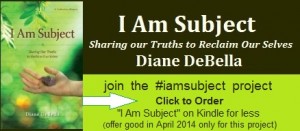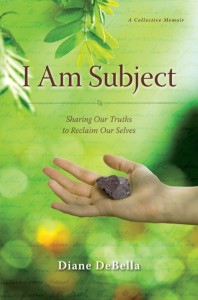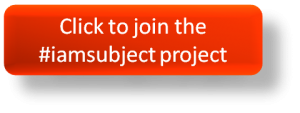I Am Subject: We Write What We Need to Learn
Meet US Author Diane DeBella. She’s is our Site Sponsor through early June 2014. Her book “I Am Subject” is highly relevant to each of us as women, and as women writers. It is about being subject of our own lives, not objects, not adjuncts to the lives of others. Stay a while. Linger here and find out who Diane DeBella is. Why did she write a book called “I Am Subject“? What is in it for you? Join us as we launch an #iamsubject project inviting women writers (and women who write) to write your own #iamsubject story on your own blog (or a friend’s) and be considered for inclusion in a new #iamsubject anthology that we will be publishing jointly with Diane (if we have fifty participants.) – Anora McGaha and Barbara Bos, WWWB
In March 2014, I had the tremendous good fortune to meet Gloria Steinem at an event in Denver. She was gracious enough to sign my copy of her book, Revolution from Within: A Book of Self-Esteem. In the few moments I spoke with her, I struggled to express the impact her book had on me when I first read it years ago.
Her discussion of core self-esteem versus situational self-esteem and internal versus external barriers in the lives of women ignited the very first flicker of awakening that I experienced on what was to become a painful, lengthy, and ultimately rewarding excavation of my past—a journey that would help heal my wounds and would also completely shift the focus of my life’s work.
She grew thoughtful as she listened, as if she were remembering exactly where she was when she put pen to paper to write the book. Then she looked at me and said, “You know, we write what we need to learn, don’t we?”
Yes, we do. When people ask me why I wrote I Am Subject: Sharing Our Truths to Reclaim Our Selves, my first answer is that I had to write it. It really wasn’t a choice.
It was a work that would not let me go, no matter how many times over the course of 15 years I tried to walk away from it. I wrote the book I had to write—for me, for the women who came before me, and for the girls yet to come.
I tell the stories of other women writers’ lives because through the discovery of their stories, I came to a better understanding of my own. Mary Wollstonecraft was a brilliant self-taught scholar, philosopher, and writer, but it was her life story that I could identify with—an alcoholic father, broken mother, and a resultant lack of self-esteem that created a void she could never completely fill.
Kate Chopin was a woman generations ahead of her time. Left a widow with six children under the age of eleven, and battling significant debt, she turned to writing at age 36 in order to make her own way in the world and provide for her children.
Through fiction, she found the strength to write female characters for whom the traditional role of wife and mother had left them with so little sense of self that sometimes death was the only way out. She also wrote of women like herself, who not only stepped out of the confining box of traditional wife and mother, but splintered the box into tiny, insignificant pieces, instead embracing passion and pain, love and lust, and defining their own way of being in the world.
Adrienne Rich was also revolutionary in both her life and her work, leaving a marriage and three children, embracing life with a same-sex partner, and writing her own raw truth about her less than idyllic experience with motherhood.
These women and all the others I include in I Am Subject helped me examine my own life story and commit it to paper, interwoven with their life stories in a collective tapestry of memoir that provides countless teachable moments.

Click here to join the #iamsubject project and order I Am Subject on Kindle at a big discount.
In fact, I have seen firsthand how sharing our stories can help other women to develop a better understanding and appreciation of where they have come from, and to clearly define a more genuine path as they move forward—no matter what life stage they are experiencing. I include my own students’ reflections in this work because once I began to pay it forward and share and teach women’s truths to the young women in my classroom, the magic truly began to unfold.
Learning other women’s truths in a safe space and place has allowed these young women to move forward along their paths with their eyes wide open. Many of them are at first shocked that other women share their truths so openly: “How in the world can these women invite complete strangers into their lives without being afraid and ashamed of the repercussions their writing might create?”
Yet after significant reflection, they can often answer this question themselves, as they realize that these writers, myself included, are sharing their stories so that other women can know they are not alone.
Women are conditioned to retreat deep within themselves to seek comfort, when in fact they would benefit by turning to the words of other women for support and guidance. Women deserve to be the authors of their own stories; if they choose to veer off the path they are on and forge a new, more genuine one, they can then rewrite their lives.
The women who came before me found the strength to share their own pain, and I have learned from their life lessons. I am revealing my pain so that others can learn from me. My goal is to recognize the women who came before me, those I am surrounded by right now, and the girls I see every day—the teenagers who think it’s more important to be an object than it is to be subject of their own lives. My own daughter is just beginning to question her abilities and her self-worth, and I want my story to help her navigate whatever lies ahead. That’s what self-disclosure is about.
So yes, Gloria. We do indeed write what we need to learn. That’s what this work is all about.
—
Diane DeBella has spent twenty years examining women writers, women’s history and feminist issues. She currently teaches at the University of Colorado in Boulder and has work published in numerous journals, including California Quarterly, Vermont Literary Review and Montpelier.
Diane is the author of a recently released memoir, I Am Subject: Sharing Our Truths to Reclaim Our Selves. She is the recipient of the CU Women Who Make a Difference Award and the CU-LEAD Alliance Faculty Appreciation Award.
Through her organization I Am Subject, Diane offers workshops and presentations on issues that affect girls and women of all ages and during all life stages, providing a safe space to increase understanding and awareness, as well as develop a stronger system of support and community.
To learn more, visit www.iamsubject.com
Follow Diane on twitter @DianeDeBella
Category: Contemporary Women Writers, US American Women Writers, Women Writing Memoirs, Women Writing Non-Fiction







Thanks for this inspiring post, Diana. You have given me a new wind – I have been working on a novel inspired by my mother’s life and the cycle of life for mothers and their daughters – and you have brightened up my day and made me want to go on. 🙂
Miriam,
I needed the support of other women to finish my book – support from the women in my immediate community, including friends, colleagues, and family – and the support of the women I included in my book, my muses who would whisper (or sometimes shout) encouragement when I most needed it. Consider me a supporter. I look forward to hearing more about your book, and if you have an #iamsubject story to share, I hope you will do so. http://www.iamsubject.com/women-writers/the-iamsubject-project/
Diane
Yeah!!! Connected with what you had to say and congrats on your book. Looking forward to following along your journey, and I hope to contribute to #imasubject one day. Good luck and thanks again 🙂
Thank you, Lani! I hope you do decide to share your own #iamsubject story, and I look forward to reading it!
http://lanivcox.wordpress.com/2014/05/13/my-iamsubject-story/
Hugs from Thailand 🙂
“I could say each day is filled with the opportunity to reclaim oneself, because unless we are paying attention, I-as-subject can slip through the window and float away.” Beautiful! Thank you, Lani, for sharing your story! It is filled with poignant life lessons. This is one of the important ways women can support one another – by sharing our truths.
Wow, Diane, thank you for this post. I am going to try to incorporate the idea of being the subject of your own life into discussions with my two kids, both young teenagers. Very powerful stuff.
Wow, Diane, thank you this post. The idea of being the subject of your own life is so powerful. My kids, both young teens–one girl, one boy–are both questioning their self worth right now, and trying to figure out where they belong. I’m going to try to incorporate this idea of being the subject of your life into discussions with them.
Mary,
I have boy/girl twins who are now teens. I focus much of my work with young people and parents on the premise of authentic parenting, and keeping our children subject of our own lives. Middle school is a particularly vulnerable time, especially for girls, as they can make the dangerous shift from subject of their own lives to object of someone else’s. It is also the time where boys–in large part because of the cultural messages they are bombarded with–begin to view girls as objects rather than subjects. I recently spoke to parents at a middle school about the importance of keeping adolescent girls subject of their own lives, and the feedback I received reinforced what I already knew–we need to make these issues a priority. We need to focus on healthy relationship development–with self and others.
Thanks Diane! I totally agree about middle school being an extremely vulnerable time, and it’s interesting and terrifying to see how my kids are dealing with it. The boy (who’s in 8th grade) is handling it so differently than the girl (who’s in 7th). At this particular moment, the girl seems to be thriving and really being the subject of her life and decisions, while I see my son acting like an object in many cases this year. I talk to him as much as possible about his behavior and decisions, but he usually doesn’t want to hear from me. It seems easier with my daughter, but I’m thinking that will change soon too. Thanks again for this insightful post. Also, I’m sorry about the double comment earlier. I didn’t realize it went through the first time and couldn’t figure out how to delete one.
Mary,
Yes, boys are also influenced by societal expectations and gender roles. One of my students at the university recently wrote a paper on his struggle with muscle dysmorphia. If you haven’t seen Jennifer Seibel Newsom’s Miss Representation, it is an extremely eye opening view of what it means to be a woman in our society. She is also putting the finishing touches on a follow up film about masculinity titled The Mask You Live In. I can’t wait to see it.
No worries about the duplicate comment!
Diane
I have not yet seen Miss Representation, but am hoping to soon. Have heard amazing things about it. Also great to hear about the film on masculinity. Will keep an eye out for that!
Thanks again!
Mary
Splendid–from the heart. Important and provocative.
Thank you, Catherine. I like that you used the word ‘provocative.’ One of my hopes is that my work will help provide a safe space for contemplation and increased awareness, which will then move us toward important conversations and action.
Hi Diane,
Congrats on publishing your latest! I’ll be sharing this project with the membership of Greater Seattle Women Who Write. and hope many will sign up for #iamsubject.
Question: I see on your website POST the link to your blog post in the comments on this page http://www.iamsubject.com/the-iamsubject-project/ but there’s no comment section as far as I can see.
Please advise.
Best, Judith
Hi Judith –
This is Anora from Women Writers, Women Books. We’re thrilled that you’re sharing this project. Thank you so much.
One page is about the project and at the bottom it lists the link to the blog post where you can post comments.
Intro Page: http://www.iamsubject.com/women-writers/the-iamsubject-project/
Blog Page where you can post comments: http://www.iamsubject.com/the-iamsubject-project/
Anora
Judith,
I am so glad you are sharing the project with the Greater Seattle Women Who Write! If you go to http://www.iamsubject.com/the-iamsubject-project/ it should take you to the blog post where you can provide your link in the comments. You can also link to the blog post on the right sidebar of my website. I hope this information helps. If not, let me know!
Thank you for your interest!
Diane
I strongly agree, not because we will get sympathy, help or anything else, but by writing our own experiences in an acceptable way we may help others who are suffering like we are. In situations when the mind can stagnate & even lose hope, books are soothing and can pave the way for your next action. Personal stories may help you refine and frame your thoughts to finally be courageous & motivated.
Prabha,
How beautifully stated! And yes, when we share our stories, it is healing for us, but our greater goal is to offer our experiences in order to help provide support for others. I also want other women and girls to realize that their stories matter!
I agree, we write what we need to learn. What we need to discover or uncover, bring to light and wrest- or coax- from the shadows. What we need to unfold or heal, to acknowledge and to pay respects to. What we need to exorcize or resuscitate, to grow or to harvest. We may not always know it. In fact, it might be better if we don’t, but the deep needs that drive our writing cannot be denied.
So beautifully stated, Marialena. I was engaged in all of those activities – some extremely painful and others overwhelmingly empowering – while I was writing I Am Subject.
This is electric, what you write… Filled with the energy that seeks to ignite others. I’m convinced now that I have to face the title that keeps popping into my head and begging to become more. Something in the way you’ve expressed your thoughts reminds me that the only way to understand why it insists is to write it and see what the heck I’m trying to tell myself. Thank you!
Donna,
Thank you for your thoughtful comment. I firmly believe that hearing other women’s truths helps us discover our own.